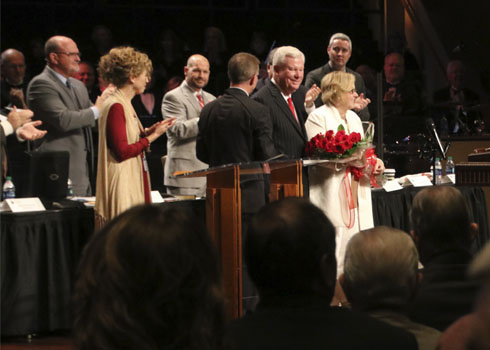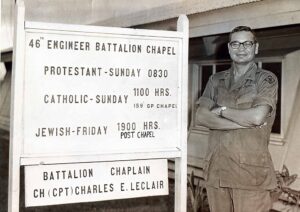
LAWRENCEVILLE, Ga. (BP) — Messengers to the 196th annual meeting of the Georgia Baptist Convention recognized J. Robert White on his 25th anniversary as GBC executive director, approved a $41.2 million budget and collected more than 34,000 backpacks for needy children.
 Messengers gathered at North Metro First Baptist Church in Lawrenceville for the Nov. 13-14 meeting, which was preceded by the Sunday evening Inspirational Rally where International Mission Board President David Platt, an Atlanta native, spoke.
Messengers gathered at North Metro First Baptist Church in Lawrenceville for the Nov. 13-14 meeting, which was preceded by the Sunday evening Inspirational Rally where International Mission Board President David Platt, an Atlanta native, spoke.
During the GBC meeting, messengers elected Mike Stone, pastor of Emmanuel Baptist Church in Blackshear, as president over Fred Lodge, pastor of First Baptist Church in Blairsville. A total of 946 votes were cast for president with Stone receiving 553 votes to Lodge’s 391 votes. There were 1,301 messengers registered over the course of the two-day meeting.
Stone follows outgoing President Thomas Hammond, pastor of First Baptist Church in Alpharetta, who completed his second one-year term.
Also elected were Greg Bentley, associational missionary for Altamaha and New Sunbury Baptist associations, first vice president; Rando Acres, pastor of Center Hill Baptist Church in Loganville, second vice president; Bill Marlette, pastor of First Baptist Church in Adel, third vice president; and Michael Wilkes, pastor of Center Baptist Church in Helen, fourth vice president.
During the budget presentation shared with Executive Committee member Randy Wood of the Georgia Baptist Mission Board, White lamented the ongoing decline of Cooperative Program giving and its impact on reaching Georgia — and the world — for Christ. However, White rejoiced that 40 percent of Cooperative Program receipts will be forwarded to Southern Baptist Convention ministries in 2018.
In addition, a total of 13.74 percent — or $5,660,880 — will be allotted for Georgia Baptist ministries. Entities receiving that funding are three universities and colleges, Shorter University, Truett-McConnell University and Brewton-Parker College; the Ministerial Education Fund; the Education Commission; Baptist Village; Baptist Retirement Communities of Georgia and the Georgia Baptist Foundation.
The remaining 46.26 percent — $22,127,864 — will fund Georgia Baptist Mission Board ministries beginning in Georgia and extending around the world. Included in that amount is additional non-Cooperative Program income the board expects to receive of $1,500,000 from the Mission Georgia Offering; $522,000 from cooperative agreements; and $1,046,744 from investment, registration and other income.
Messengers approved, as part of the overall budget, a new line item known as Benchmark Funding created to encourage its educational institutions to excel in four specific areas, with a bonus for reaching all four incentives. Those incentives, each valued at $60,000, will introduce friendly competition for annual awards based on:
— increased enrollment of fulltime, degree-seeking Georgia Baptist students versus the fulltime equivalent enrollment (FTE) standard.
— the highest percentage of fulltime ministerial students.
— the highest percentage increased enrollment of fulltime degree-seeking students who are not necessarily Georgia Baptists.
— the Biggest Fund Raiser Award to the school that has the biggest fundraiser for the school year.
A bonus $60,000 award, known as the Grand Slam, will be awarded to the college or university that achieves all four incentive awards in the same year. The institution reaching the four incentives and the Grand Slam will receive $300,000 for that year.
The new funding was created following the adoption of a task force report on the mission board’s education institutions.
The CP budget is a 2 percentage point decrease from last year’s 42 percent sent to the SBC from the state’s Cooperative Program receipts, with the funds being redirected to Benchmark Funding.
After the budget presentation, messenger Philip Corbean, pastor of Carver Baptist Church in Douglas, questioned the rationale for not following the 50/50 funding allocation that has been embraced by other state Baptist conventions. Corbean referenced IMB President David Platt’s sermon during the Sunday evening Inspirational Rally, and Platt’s graphic depiction of the horrors of hell that await those who do not hear the Gospel.
Corbean also referenced the 2010 Great Commission Task Force Report which urged state conventions to move to a 50/50 allocation of Cooperative Program funds between those that remain in the state and those forwarded to the SBC. The funds forwarded to the SBC are distributed among the two mission boards, one of which is the International Mission Board, and other entities, such as the SBC’s seminaries.
White responded by explaining that the 50/50 division of funds, which was spelled out from the founding of the Cooperative Program in 1925, also specified that churches would follow the same formula and keep 50 percent of their offerings and forward 50 percent to the state convention which would then forward 50 percent to the SBC.
However, White acknowledged the steady decline of churches giving to the Cooperative Program, with the average amount now at 5 percent.
While highly supportive of reaching the nation and world through the North American and International Mission boards, White said the Georgia Baptist Mission Board also has a historic obligation to support its own ministries to reach the state for Christ.
“If we didn’t have our own institutions I would be in favor of sending 52 percent or even 54 percent out of state” but added that he did not see the wisdom in defunding the GBC’s entities.
White noted the value of those institutions as grassroots priorities to reaching the world with the Gospel. For example, he stated that Georgia Baptist colleges and universities “provide the missionaries for the field. We are a missionary supporting and sending convention” and Georgia is part of the pipeline that educates missionaries who are called to the North American as well as international fields.
John Waters, pastor of First Baptist Church in Statesboro, was recognized and said he wanted to clarify a common misperception that the IMB continues to struggle with reduced number of missionaries on the field due to recent drastic cutbacks.
Waters noted that IMB President David Platt recently reported that the board is now operating in the black with a balanced budget and is back on track with missionary appointments. He added that Southern Baptists can be assured that the IMB is operating at greater efficiency than in past years and is being a proper steward of the gifts it receives from churches and state conventions.
Following the discussion, messengers voted to approve the budget as presented.
In other business, messengers recognized two legislators — Rep. Wes Cantrell and Sen. Marty Harbin — “for their leadership and commitment to Godly principles” as they represent their constituents at the statehouse.
Grady Caldwell, pastor of New Mercy Baptist Church in Griffin, presented the annual report detailing the number of churches newly affiliated with the Georgia Baptist Convention, encompassing 32 churches and four missions.
White honored
White, as Georgia Baptists’ longtime state executive, was lauded for more than two decades of GBC growth and effective use of resources even in the midst of the recession that hobbled the convention beginning in 2008. During those tough years, the staff underwent many painful downsizings and budgets were slashed, yet the convention maintained an effective ministry in the state.
Four of White’s peers in other Baptist state conventions brought commendations via video.
“You’re one of my best friends and somebody I have such regard for,” commented Anthony Jordan of the Baptist General Convention of Oklahoma. “You’re a visionary leader and [have] done a remarkable job … for Georgia Baptists.”
Rick Lance of the Alabama Baptist State Board of Missions spoke of White being a resource, saying, “I don’t know how many times I’ve thought to myself, ‘I need to talk to Bob White about that’ when I have a challenge or problem.”
Pointing out the Georgia executive director’s roots in his home state, Lance said, “You’ve meant a lot to Alabama Baptists…. I appreciate you walking the path — the journey — with me and with others. You are a Barnabas, an encourager.”
Other video messages relayed compliments from Milton Hollifield, executive director-treasurer of the Baptist State Convention of North Carolina, and Jim Futral, executive director-treasurer of the Mississippi Baptist Convention Board. SBC Executive Committee President Frank S. Page couldn’t attend in person but extended his thanks and congratulations on video as did First Baptist Woodstock pastor Johnny Hunt, who was en route to help facilitate a pastors’ conference in Southeast Asia.
Also on video, Samford University President Andrew Westmoreland conferred an honorary doctorate on White from the latter’s alma mater, presented in person by R. Philip Kimrey, vice president for student affairs and enrollment management.
R. Albert Mohler Jr., Southern Baptist Theological Seminary president and former Christian Index editor, during the previous day’s Preaching Conference, presented White with the seminary’s Distinguished Alumnus Denominational Service Award. Past recipients include E.Y. Mullins, W.A. Criswell and Hershel Hobbs.
Roger S. Oldham, SBC Executive Committee vice president for convention communications and relations, delivered an EC resolution of appreciation for White’s leadership and championing of the Cooperative Program. During White’s tenure, Oldham said, Georgia Baptists have contributed $1.1 billion to the Cooperative Program.
Robert’s wife Janice, awarded the Trudy Price Award for 2017 during the convention’s annual ministers’ wives luncheon, was cited for her significant role in balancing her life between working to provide financial support to the family during their seminary years, providing spiritual support to her husband, and being a nurturing mother to the couple’s three daughters.
Messengers received a copy of the updated history of the Georgia Baptist Mission Board, which was authored by Christian Index editor Gerald Harris. The 700-page history spans 45 years, from 1972 through the week prior to the convention meeting. It also includes a focus on White’s 25 years of leadership and the impact of the Conservative Resurgence on the state and national levels of the SBC.
Backpacks’ 5th anniversary
This year’s backpacks ministry was expanded to include children in two southwest Georgia associations with some of the state’s highest childhood poverty rates. The theme was modified from “Backpacks for Appalachia” to “Backpacks for Hope” to highlight the dual needs for backpacks containing Bibles, Christian books, clothing, school supplies and hygiene items.
Bethel Baptist Association in Edison and Summerhill Baptist Association in Dawson were this year’s expanded recipients.
Last year Georgia Baptists donated a record 35,571 backpacks, surpassing 2015’s record collection by 1,337. Georgia Baptists have shattered each year’s goal since the initial 4,400 were collected in 2012.
That was the year when then-GBC President John Waters, pastor of First Baptist Church in Statesboro, issued the call and churches responded on relatively short notice.
In addition to the two South Georgia associations, backpacks will be delivered to distribution sites — many through North American Mission Board ministries — in eastern Tennessee and Kentucky, West Virginia, Pennsylvania and New York state.
This was the fifth year of the collection and will push the total backpacks distributed to at least 160,000. Nuckolls has reported at least 4,000 professions of faith through Georgia’s involvement in the outreach.
This year’s goal was 35,000 but the 34,000 collected at the meeting indicated the goal will be easily passed as the items continue to filter in to collection points.
Other state conventions joining the effort include Alabama, North Carolina, South Carolina, Kentucky, and the SBC of Virginia.
Next year’s messengers will return to Second Baptist Church in Warner Robins for their Nov. 12-13 meeting. The Central Georgia church last hosted the meeting in 2012.













